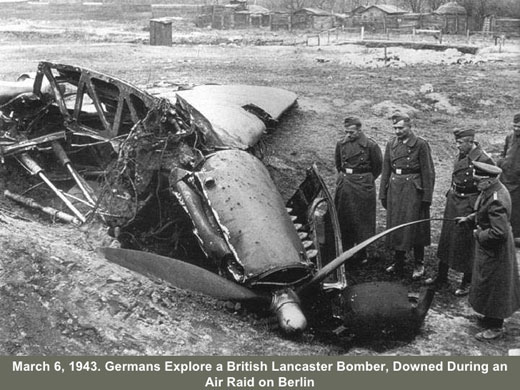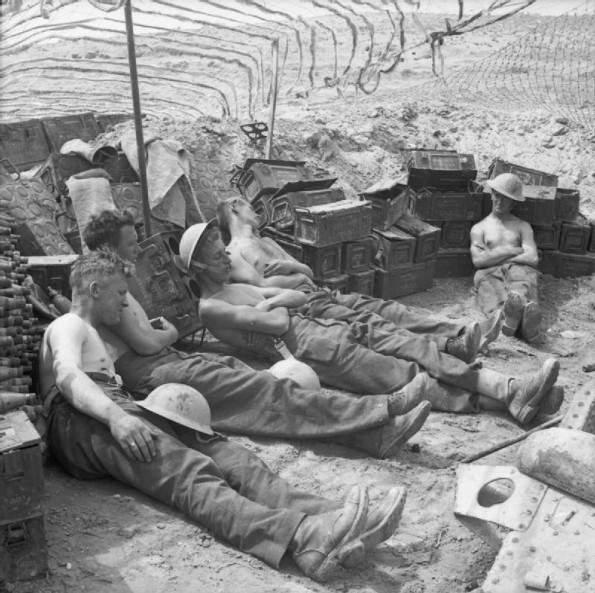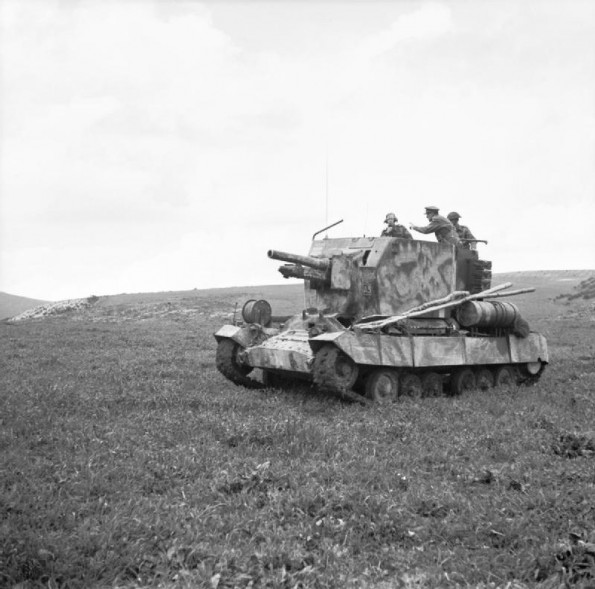Germans Explore a British Lancaster Bomber |
 |
Air Operations - Bismarcks
90th Heavy Bomb Group B-24s mount individual attacks against the Gasmata airfiels on New Georgia and shipping off Talasea.
[Air Operations - CBI
BURMA- 4 7th Heavy Bomb Group B-24s attack shipping near Pagoda Point and strafe a lighthouse, a radio station, and a lightship.
- Other B-24s dispatched to attack a bridge at Pazundaung are unable to reach the target, but one bombs Pagoda Point Airdrome. 6 more B-24s are sent to attack a bridge at Myitnge are unable to reach the target.
- In the first successful mission of its kind in the region, USAAF C-47s based at Chabua Airdrome in the Assam Region of India air-drop supplies to Chinese Army units operating in the Naga Hills.
Air Operations - New Guinea
- 3rd Light Bomb Group A-20s attack targets around Guadagasal and 90th Heavy Bomb Group B-24s mount individual attacks against shipping near Manus Island in the Admiralty Islands.
[Air Operations - Solomons
- XIII Bomber Command B-24s attack the Ballale and Kahili airfields on Bougainville.
- Japanese Navy aircraft attack the new US base in the Russell Islands. This is the first indication that the Japanese know that the Allied forces have advanced from their bases on Guadalcanal. 67th Fighter Squadron P-39s down 4 D3A 'Val' dive bomber over the Russell Islands between 1323 and 1344 hours, and a VMSB-132 radioman-gunner downs an A6M Zero near the Russell Islands.
Air Operations, Tunisia
35 IX Fighter Command fighters take part in the British 8th Army's defense by strafing and bombing German Army positions along the Mareth Line.
[Axis Diplomacy
Japan again tells Berlin it can not enter the war against the Russians.
[Battle of the Atlantic
Over the next 2 weeks a U-boat 'wolf pack' attacks convoys SC-121, HX-228, SC-122 and HX-229 sinking 21 ships totalling 140,842 tons. 4 U-boats are destroyed. Commodore Harry Birnie of SC-121 is lost with his ship the Bonneville.
[CBI
BURMAThe Chindits make a series of demolitions on the railroad between Nankan and Bongyaung.
[Eastern Front
In the central sector the Russians capture Gzhatsk on the approaches to Vyazma south of Rzhev.
CENTRAL SECTORThe 5th Army regains Gzhatsk from the IX Corps as the German withdrawal continues.
SOUTHERN SECTORHeavy fighting erupts around Novaya Vodolaga as the SS Panzer Corps envelops the town. SS units also thrust toward Valki, forcing the Soviets to fall back south of Lyubotin. The XLVIII Panzer Corps is involved in continued heavy fighting at Taranovka.
[North Africa
TUNISIAAt 9:00a.m. the Germans of Rommel's Afrika Korps mount a major attack on Medenine but are driven off. In the afternoon the attack is renewed half-heartedly but to no effect. The British and New Zealanders are surprised by the inept performance of their veteran opponents - for the antitank gunners it has been almost like shooting on a range. The Germans lose 50 of their tanks for absolutely nothing and now have only about 100 left. Rommel has not wanted to attack now and has taken little to do with the planning. He would have preferred to withdraw to Wadi Akarit. He realizes that efforts to relieve the pressure in the west are useless. He makes a sudden about-turn and prepares to face the inevitable offensive by the British 8th Army, which is getting ready to assault the Mareth Line. Advance elements of the Allied troops are established around Medenine, while the main body is safely behind minefields and anti-tank defenses. Montgomery's Order of the Day declares 'The enemy is now advancing to attack us. . . We will, in fact, give him a very bloody nose.' At noon the Axis forces fall back before the fire of the British anti-tank guns.
Gen George S. Patton takes command of the US Army II Corps.
In the British 1st Army's V Corps area, the Germans maintain pressure against the northern flank of the corps in the Tamera area. In the US II Corps area, Gen Patton takes command of the corps, relieving Gen Fredendall. At head of the I Armored Corps in Morocco, Patton had been preparing to command US troops slated for the invasion of Sicily. Maj-Gen Omar N. Bradley, who is to succeed Patton after operations in southern Tunisia are over, becomes deputy corps commander.
|
|
In the British 8th Army's XXX Corps area, Rommel makes his last attack in Tunisia and is decisively defeated. 4 strong thrusts toward Médenine are repulsed by the British, who commit only one squadron of tanks. The Germans retire after nightfall having lost about 50 tanks.
[Pacific
- Japanese aircraft bomb the Russell Islands, which were occupied by the Americans on February 21.
- 3 American cruisers and 7 destroyers, under the command of Rear-Adm A. S. Merrill, shell Vila and Munda, important Japanese bases in the Solomons. Attacked by inferior enemy forces, they sink 2 destroyers, the Minegumo and the Murasame.
- The US submarine Triton (SS-201) sinks the Japanese army cargo ship Kiriha Maru (3057t) about 145 miles northwest of the Admiralties. Triton, which reports her success on March 11, is never heard frm again.
United States, Home Front
Roosevelt appoints a top-level committee to look into the manpower problems of US industry. Among the committee members are James F. Byrnes and Bernard Baruch.
[
